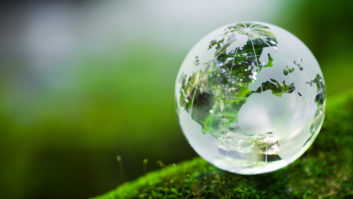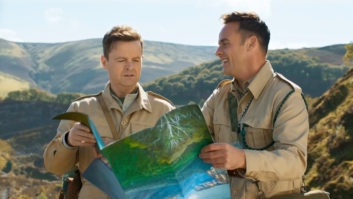At November’s Cop26 event, a number of UK broadcasters signed up to The Content Climate Pledge, agreeing that they will develop processes that help them to consider climate themes when commissioning, developing and producing content, as well as learn from and inspire each other.
Here, the broadcasters reveal the steps they’ve taken away from production to help drive the move towards sustainability.
Danielle Mulder, BBC group sustainability director: Our new net zero plan, announced in the autumn, is centred around a deep de-carbonisation drive which is aided by our previous decision to purchase renewable electricity to power our buildings – this is already helping to keep our CO₂ emissions down. Additionally, we’ve also installed LED lighting, smart meters and a focus on reducing single use plastic across our estate.
Martyn Freeman, BBC Studios chief operating officer: As part of our work to reach net zero carbon emissions we are measuring, reducing and offsetting our emissions across all business areas. We have measured our carbon across our business to establish a baseline carbon footprint and have established targets to reduce it. This is an area we will continue to focus on as we better understand our footprint and work towards our net zero target.
We are taking a phased approach, starting with the elements we directly control, such as our offices and travel and then expanding the scope. For example, UK offices use renewable energy, our headquarters at Television Centre was refurbished to SKA Gold certification, and we have cut non-filming-related travel by 50 per cent. We are also working closely with the BBC Group on eliminating single use plastics and waste sent to landfill.
We have global sustainability delivery groups across our offices, who are passionate about the environment and can ensure we can continue to improve on a company and individual level.
Yeshna Mistry, sustainability manager, Channel 4: We’ve made progress reducing our Scope 1 and 2 emissions by changing how we work across all our offices, training all staff in sustainability, amending our travel policy to greener ways of moving and offsetting any remaining business travel emissions. We’ve also started integrating sustainability asks into contracts across suppliers to support progress in the value chain.
Simon Downing, SVP Marketing and head of factual and documentaries, Discovery UK: Discovery has implemented permanent changes in its global office locations, including reduction of single-use plastic, food waste reduction, meatless Mondays, low flush toilets and urinals, composting areas, recycling, contracting with no-landfill waste haulers and rainwater collection systems to irrigate green areas. In addition, ‘GreenD’ is Discovery’s global employee interest group, leveraging the power of employees to champion environmental awareness and sustainability within the company and our community. GreenD aims to inspire positive environmental changes by educating and empowering Discovery employees, and engaging leadership on sustainable programmes and initiatives.
Susie Braun, director of Social Purpose at ITV: Our Climate Action targets involve reducing our Scope 1 and 2 emissions by 46 per cent by 2030, being a Zero Waste business by 2030, ensuring our supply chain is aligning with our targets by 2030, and developing a culture of climate action across the business.
A range of actions are already under way to ensure we achieve these ambitious targets. For instance three-quarters of our electricity now comes from renewable tariffs, we are switching off inefficient boilers wherever possible and moving our technology onto the cloud to remove the need for data centres in our buildings.
To build a culture of sustainability, we are ensuring that all staff members complete Climate Action training, and there is a network of Green Teams in every division of the business, driving action locally and ensuring that reducing our environmental impact is indeed everyone’s job at ITV.
Eileen Duggan, manager sustainability and environmental Services, RTÉ: RTÉ is the only broadcaster in Ireland or the UK to have developed its energy management systems to ISO 5 0 0 0 1 accreditation. We have already achieved energy savings of 57.1 per cent against the 2009 baseline, putting us ahead of the targets set out under the National Energy Efficiency Action Plan
In 2020 RTÉ was re-certified with the Business Working Responsibly Mark, one of only 60 companies in Ireland to be certified to this standard. Since 2017 we have zero waste going to landfill and in 2020 we reduced RTÉ’s overall waste levels by 30 per cent.
RTÉ has phased out single-use plastics in its restaurant operations, as well as launching a collaborative project with our drinking water suppliers to eliminate plastic cups at watercoolers. RTÉ plans to roll out further measures relating to control and use of plastics in the coming years. We have also provided chargers on site for electric vehicles and have in place a sustainable renewal policy for our fleet.
Owen Evans, chief executive, S4C: This pledge is the first step in our measures to introduce sustainability measures into S4C. It’s important to us that we begin our pledge by focusing on our programmes, which is the heart of our organisation. We will then focus on other elements including our offices, buildings and staff.
Fiona Ball, group director Bigger Picture at Sky: In February 2020, we set an ambition to be net zero carbon by 2030 across our entire value chain and have made significant progress on this transformative journey.
In 2021 we met our RE100 target of sourcing 100 per cent renewable energy across the entire business, which in turn contributed to a 22.7 per cent reduction in emissions across Scopes 1 & 2 from the 2018 baseline.
As a business we’ve been carbon neutral since 2006, removed all single-use plastics from our business in 2020 and have started transitioning our entire fleet of 5,000 vehicles to electric.
Simon Pitts, CEO, STV: Our STV Zero strategy includes a concerted programme of actions and targets that involves every part of our business and operations and every member of our management team is accountable. We’re working with our partners, suppliers, programme-makers and viewers to deliver this strategy to become a carbon net zero business by 2030.
Within the business, we’ve gone from circa 7 per cent to over 90 per cent renewable energy across our buildings, and we’ve put in place targets to halve business travel in the next couple of years. As is the case with many organisations, the pandemic has brought about a new way of working and this hybrid working model – supported by investment in more efficient technology – allows us to prioritise our impact on the climate in decisions about how we work.
Our management board each have personal objectives to support delivery of our STV Zero targets, and we’re delivering a programme of sustainability training to all staff. We’ve banned single use plastics and are working towards becoming zero-waste as STV colleagues make small changes to ‘avoid, reduce and recycle’ to drive down our carbon footprint.
Simon Brown, chief strategy officer, UKTV: As well as using our public platform to engage audiences, we’re also getting our own house in order. UKTV and the wider BBC Group have publicly committed to reaching Net Zero emissions by 2030 at the latest. And to put our money where our mouth is we’ve signed up to the TCFD which requires us to transparently publish annual reports tracking our progress on this journey. Net Zero requires us to reduce our scope 1 & 2 emissions (building and direct operations) by -46 per cent and Scope 3 emissions (supply chain) by -28 per cent. But what does this look like in practice?
Well in terms of direct operations we’re moving all of UKTV’s energy supply to renewables. We’ve removed all single use plastics from across the organisation and currently recycle 75 per cent of all waste with a target of zero waste to landfill by the end of next year. In terms of business travel, we’re taking advantage of the Covid enforced switch to remote working by ensuring future travel emissions remain at least 50 per cent below pre Covid times.
More anecdotally we’ve just completed a major office refit to reflect new working patterns with the entire project being paper-free, utilising sustainable transportation and ensuring that all existing furniture was up-cycled to minimise physical waste.
You can read more of TVBEurope’s roundtable with the Content Climate Pledge signatories in our January/February 2022 issue.







